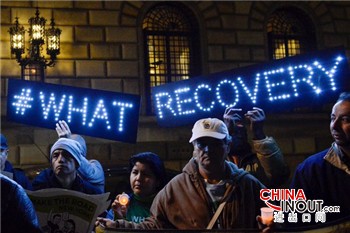华盛顿——本周三,美联储(Federal Reserve)表示将自金融危机爆发以来首次提高短期利率。就在全球其他很多地区的经济发展步履维艰之际,此举给美国经济的强劲投下了信任票。
这个决定符合外界的广泛预期,是美联储在金融危机后采取的经济刺激行动的一个里程碑,结束了它七年来将短期利率维持在接近于零的状态。然而,即使基准利率本次上调了0.25个百分点,到达0.25%至0.5%的区间,美联储也强调,后续的加息步伐将会相当缓慢。
加息决定宣布之后,美联储主席珍妮特·L·耶伦(Janet L.Yellen)在新闻发布会上表示,这个决定“承认了在恢复就业、增加收入、缓解困扰无数美国普通民众的经济困难方面,美国取得了相当大的进展。”
未来数年,抵押贷款等各种类型的贷款及储蓄账户等各种类型的投资的利率,很可能仍将维持在历史低位。
耶伦在2014年初成为美联储主席,开始加息是该机构在她领导期间做出的最重要的、风险最大的决定。
自金融危机结束以来,所有加过息的其他发达国家全都被迫走上了回头路,因为事实证明,它们的经济状况无法承受更高的利率。随着投资者抛售高收益垃圾债券,并从发展中国家的市场里抽走资金,某些金融市场已经出现了承压迹象。
加息决定获得了联邦公开市场委员会(Federal Open Market Committee)中10个拥有投票权的成员的一致支持。虽然其中三名成员在近几个月里表示了担忧,认为美国经济可能还没有为更高的利率做好准备,他们仍然赞成了此次加息举动。一些外部经济学家同意这种担忧,一些民主党人也认为美联储此举将过早地削弱就业和工资增长。
在声明中,美联储把就业增长的力度以及缓慢但稳定的经济增长的大背景列为证据,证明美国经济不再需要超低借贷成本提供那么多的帮助。
美联储官员本周三还发布了一系列预测,表示他们预计在未来三年内将以每年一个百分点的速度提高利率,至2019年时达到3.3%。

WASHINGTON — The Federal Reserve said on Wednesday that it would raise short-term interest rates for the first time since the financial crisis struck, a vote of confidence in the strength of the American economy at a time when much of the rest of the global economy is struggling.
The widely anticipated decision, a milestone in the Fed’s postcrisis stimulus campaign, ends a seven-year period in which the Fed held short-term rates near zero. Even as it raises its benchmark interest rate by 0.25 percentage points, to a range of 0.25 to 0.5 percent, however, the Fed emphasized subsequent increases would come slowly.
The decision to raise rates “recognizes the considerable progress that has been made toward restoring jobs, raising incomes and easing the economic hardships that have been endured by millions of ordinary Americans,” the Fed’s chairwoman, Janet L. Yellen, said at a news conference after the decision was announced.
Interest rates on mortgages and other kinds of loans, and on savings accounts and other kinds of investments, are likely to remain low by historical standards for years to come.
Moving to raise rates is the most important and riskiest decision the Fed has made under the leadership of Ms. Yellen, the Fed’s chairwoman since early 2014.
Every other developed nation that has raised rates since the end of the financial crisis has been forced to backtrack as economic conditions proved unable to handle higher rates. There are also signs of strain in some financial markets as investors dump high-yield junk bonds and pull money from developing markets.
The decision to raise rates was supported by all 10 voting members of the Federal Open Market Committee. They agreed on the move despite concern expressed in recent months by three of those officials that the economy might not be ready for higher rates, a view shared by some outside economists and by Democrats who argue the Fed is prematurely curtailing job and wage growth.
The Fed’s announcement cited the strength of job growth, and the broader backdrop of a moderate-but-steady economic expansion, as evidence that the economy no longer needed quite as much help from ultralow borrowing costs.
Fed officials predicted in a set of forecasts also published Wednesday that they would raise interest rates by about one percentage point a year over the next three years, reaching 3.3 percent by 2019.











